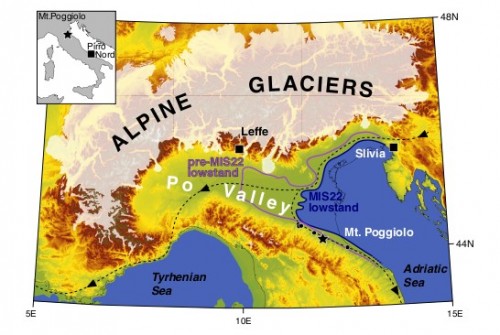Stefano Rossignoli 28 marzo 2012
Dentro la ricerca è la nuova rubrica di scienzafacile.it.
E’ un diario che spero possa rendere l’idea di come funziona almeno in parte la ricerca e poi di come funziona qui da noi la divulgazione della ricerca stessa.
Conosco molta gente in Università. Molti sono studenti di laurea, di dottorato, altri sono tecnici, ricercatori, professori associati, ordinari, ecc… si occupano di un sacco di discipline diverse tra loro ed alcuni apprezzano scienzafacile anche se non vuole essere accademico ed universitario ma ha la grandissima pretesa di mettere in collegamento il mondo accademico con quello di tutti giorni e comunque offrire anche a Studenti e Insegnanti un approccio di un certo livello, mai banale e sempre approfondibile…
Giovanni Muttoni, esperto, nonchè professore di Magnetostratigrafia nei corsi di Scienze Geologiche all’unimi (Università degli Studi di Milano) e prof di Geologia per Scienze Naturali, mi ha contattato qualche giorno fa chiedendomi se mi interessasse pubblicare un estratto da un suo ultimo articolo riguardo le prime frequentazioni degli Ominidi in Italia presso Cà Belvedere (Monte Poggiolo).

E io dico:”Fantastico! Certo che mi interessa!”.
E” un po’ il sogno di scienzafacile quello di riferire le notizie direttamente da chi fa la ricerca e non semplicemente filtrate da un giornale, rivista, televisione, ecc…
Ovviamente quindi accetto di buon grado ed è qui che comincia la fase complicata del lavoro!
Mi spiego: un giornale deve solo scrivere i risultati della ricerca (si spera in modo esatto), mentre scienzafacile vuol far capire a più gente possibile come si arriva a certi risultati…
E allora prima dobbiamo capirlo noi …e anche molto bene!!!
Come spiegavo ieri ai ragazzi di terza media in visita al Museo di Storia Naturale, non esistono i tuttologi quindi, pur avendo basi di Scienze Naturali piuttosto buone (penso) e in continuo aggiornamento, quando leggo l’articolo di Giovanni, mi rendo conto di aver bisogno una mano e coinvolgo nella questione l’amico, nonchè guest blogger di scienzafacile Davide Bertè, Dottorando a Roma che si occupa di mammiferi quaternari strettamente correlati alle frequentazioni umane del tempo…
Telefono a Davide e gli propongo di ritagliarci un po’ di tempo per vederci e leggere insieme l’articolo (nel frattempo Giovanni mi spedisce un altro articolo correlato al primo). Davide mi chiede ovviamente di che parla e io gli accenno alle prime frequentazioni dell’uomo in Italia e lui mi dice:”Ah OK. Si tratta di Pirro Nord (vicino al Gargano). Ho scavato in quel sito!”
E lì mi rendo conto che la faccenda si complica ulteriormente.
Dall’articolo io avevo appreso che il sito con le frequentazioni più antiche studiato da G. Muttoni e dagli altri coautori fosse quello di Cà Belvedere (Monte Poggiolo).
Dobbiamo assolutamente trovarci per leggere e discuterne insieme…
Riusciamo a trovarci per due pomeriggi in cui diamo una prima lettura veloce agli articoli, ci riflettiamo un po’ e il giorno dopo cominciamo a vagare per altre cinque o sei pubblicazioni per approfondire le nostre conoscenze e mitigare i nostri dubbi, ma prima di tutto, nel prossimo post vedremo cosa dicono questi due articoli e su cosa si basano, ovvero sulla Magnetizzazione delle Rocce e sulla variazione del Campo Magnetico Terrestre…
Ecco la continuazione: I primi ominidi in Italia
Ed ecco i titoli e gli Autori degli articoli pubblicati.
– Di: Giovanni Muttoni, Giancarlo Scardia, Dennis V. Kent, Enrico Morsiani, Fabrizio Tremolada, Mauro Cremaschi, Carlo Peretto – First dated human occupation of Italy at ~ 0.85 Ma during the late Early Pleistocene climate transition. Ovvero: La prima frequentazione umana in Italia datata circa 0.85 milioni di anni fa durante la transizione climatica Tardo-Pleistocenica
– Di: Giovanni Muttoni, Giancarlo Scardia, Dennis V. Kent – Human migration into Europe during the late Early Pleistocene climate transition. Ovvero: La migrazione degli Uomini in Europa durante il tardo pleistocene inferiore